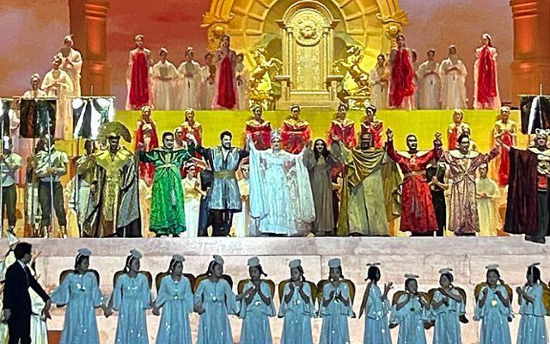The cast of the opera “Again 2024 Turandot” takes a bow after the performance on Sunday. Korea Times photo by Kim So-yeon
By KTimes
The highly anticipated opera “Again 2024 Turandot,” featuring a star-studded cast of world-renowned vocalists, opened on Sunday at Coex D Hall in Seoul amid chaotic scenes.
Despite its scheduled start time, the performance was delayed for over 20 minutes as the lobby descended into disarray, with angry ticket holders demanding answers.
“Are there more people inside the venue than out here waiting to get in?” one frustrated attendee shouted. Another ticket holder complained to a theater official, “Is this show really starting with so many of us still outside?”
The situation escalated as artistic director Park Hyun-joon tried to close the venue’s doors and begin the performance. Ticket holders who were still unable to take their seats protested vehemently, exposing operational and communication breakdowns within the production team.

Audience members for the opera “Again 2024 Turandot” wait in a long line to exchange tickets after their reserved seats were removed. Many remained without accurate seat tickets well past the scheduled start time, Sunday. Korea Times photo by Kim So-yeon
Confusion over seating arrangements
Compounding the issues was a last-minute decision by the production company to alter the seating layout. Initially planned as a large-scale event with 6,800 seats, the organizers reduced the capacity to under 4,000 due to poor ticket sales.
This adjustment led to the disappearance of many pre-assigned seats, leaving ticket holders to exchange their tickets on-site without prior notice.
A 30-something audience member who booked through Interpark said, “I reserved a seat in Section G, Row 20, but when I entered the venue, I realized Section G only goes up to Row 19.”
Another attendee complained, “I booked Row 7 but was given a ticket for Row 21 and told it was an ‘upgrade.’ If I’d known there were seating issues, I wouldn’t have waited.”
Organizers attempted to appease the growing crowd by offering refunds or alternative dates, but this only further heightened tensions. At one point, staff announced, “You can enter without a ticket and sit anywhere,” adding to the confusion.
The opera faced controversy even before opening night. Earlier in the day, director Davide Livermore announced his departure from the production, accusing the organizers of pressuring him to replicate Zhang Yimou’s 2003 version of “Turandot.”
Livermore said that he could not allow his name to be associated with what he considered a low-standard production.
“When Mr. Park (Hyun-joon) says that I have not worked, and that my assistant has not worked either, it is precisely because he prevented us from directing our production, imposing the copying of a great artist like Zhang Yimou,” Livermore said in a statement. “For me, ethically, this is unacceptable. I respect another artist’s ideas: I do not use them, manipulate them or copy them.
The organizers countered by claiming Livermore failed to fulfill his responsibilities while still demanding his fee.
With a production cost of 20 billion won (15.4 million) and ticket prices reaching up to 1 million won, the performance drew attention early on. However, audiences have criticized the disorganized ticket booths, the host’s lackluster management, inadequate information and poorly designed program booklets.
Despite the turmoil, the performance managed to complete all three acts.
A production team official said, ‘The seat adjustments were due to cancellations caused by the sudden declaration of martial law earlier this month, but the changes were not properly reflected on the reservation site. We will refund (the) customers who were unable to attend the performance.”

Audience members without tickets for the opera “Again 2024 Turandot” protest to Park Hyun-joon, chief artistic director of the opera. Korea Times photo by Kim So-yeon
Wider issues in performing arts
The challenges faced by “Turandot” are not isolated. The performing arts industry is grappling with similar disruptions.
Actor Choi Jae-rim’s health issues caused several performances to be canceled or altered mid-run. On Dec. 20, he abruptly withdrew during Act 2 of “Cyrano” at the Seoul Arts Center, and he missed subsequent performances of “Kinky Boots” in Seongnam, Gyeonggi and “Chicago” in Busan, where other actors stepped in to fill his roles.
The widespread practice of multicasting, where actors are cast in multiple roles across overlapping productions, is being scrutinized.
Critics argue that the reliance on star actors, combined with grueling schedules, leaves productions vulnerable to cascading disruptions when even one performer is unavailable.
In October, actor Seo Kyung-soo’s ankle fracture similarly forced the reshuffling of “Kinky Boots” and “Aladdin,” demonstrating how tightly packed schedules can create a domino effect across multiple shows. For audiences, these disruptions are a growing source of frustration, highlighting systemic issues in Korea’s performing arts industry.
This article from the Hankook Ilbo, the sister publication of The Korea Times, is translated by a generative AI system and edited by The Korea Times.

